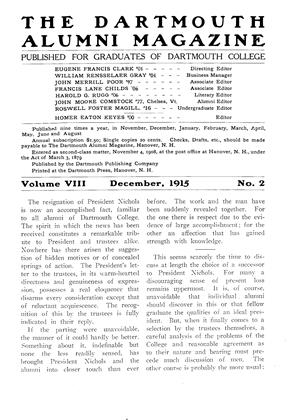Nichols is now an accomplished fact, familiar to all alumni of Dartmouth College. The spirit in which the news has been received constitutes a remarkable tribute to President and trustees alike. Nowhere has there arisen the suggestion of hidden motives or of concealed springs of action. The President's letter to the trustees, in its warm-hearted directness and genuineness of expression, possesses a real eloquence that disarms every consideration except that of reluctant acquiescence. The recognition of this by the trustees is fully indicated in their reply.
If the parting were unavoidable, the manner of it could hardly be better. Something about it, indefinable but none the less readily sensed, has brought President Nichols and the alumni into closer touch than ever before. The work and the man have been suddenly revealed together. For the one there is respect due to the evidence of large accomplishment; for the other an affection that has gained strength with knowledge.
This seems scarcely the time to discuss at length the choice of a successor to President Nichols. For many a discouraging sense of present loss remains uppermost. It is, of course, unavoidable that individual . alumni should discover in this or that fellow graduate the qualities of an ideal president. But, when it finally comes to a selection by the trustees themselves, a careful analysis of the problems of the College and reasonable agreement as to their nature and bearing must precede much discussion of men. The other course is probably the more usual: the man is chosen, and policies develop later in accordance with his initiative. This has, indeed, worked well enough in the past. Nevertheless, in the case of Dartmouth, it might, under existing circumstances, prove dangerous. Modern industrial management calls for the careful preliminary sizing up of a given position and the finding or training of the man for it. Full understanding of the task to be performed always precedes the selection of the workman and of his tools. There is ever the danger of forcing an analogy too far: a college is not a factory, however much we may speak of its graduates as a "product." Yet the need for a clear policy for Dartmouth seems to be as insistent as for a non-collegiate institution. In the light of recent events the queries addressed by the Alumni Council to the Board of Trustees take on a new, almost startling, significance. Until the outline, at least, of an answer to the third of these queries has been framed, the search for a president can be little more than a blind groping with the ultimate result depending more upon luck than upon prevision.
 View Full Issue
View Full Issue
More From This Issue
-
 Article
ArticleA DARTMOUTH MAN AT THE FRONT
December 1915 By Alexander John Marshall Tuck, '14 -
 Article
ArticleRESIGNATION OF PRESIDENT NICHOLS
December 1915 -
 Article
ArticleMEETING OF THE ALUMNI COUNCIL
December 1915 -
 Books
BooksThe Bible and Universal Pease
December 1915 By B.T. MARSHALL -
 Class Notes
Class NotesLOCAL ASSOCIATIONS
December 1915 -
 Books
BooksFACULTY PUBLICATIONS
December 1915 By P.O. SKINNER
Article
-
 Article
ArticleACADEMIC CREDIT FOR WARLIKE SERVICE
December 1918 -
 Article
ArticleWHO'S WHO IN THE FACULTY
November, 1924 -
 Article
ArticleCommencement Program
May 1942 -
 Article
ArticleArtist in Residence
NOVEMBER 1969 -
 Article
ArticleHappy (2,144-mile) Returns
June 1993 By Robert Sullivan '75 -
 Article
ArticleTHE UNDERGRADUATE CHAIR
February 1961 By TOM DALGLISH '61


